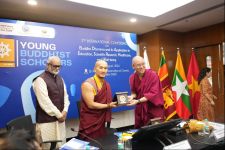IBC to organise Conference of Young Buddhist Scholars
Published: Aug 14, 2025

By TIOLCorplaws News Service
NEW DELHI, AUG 14, 2025: THE International Buddhist Confederation (IBC), New Delhi in its efforts to strengthen the role of the youth in preserving the essence of Dhamma, is organising the 3rd International Conference of Young Buddhist Scholars (ICYBS) on the 22nd August 2025. The Ministry of Culture, Govt. of India and Dr Ambedkar International Centre are part of this conference. The conference will be held at the Nalanda Hall, Dr Ambedkar International Centre in New Delhi from 9:30 am to 4:30 pm.
The ICYBS, has explored vivid themes in their previous conferences. From exploring the "Buddhist Pilgrimage" in 2023, to emphasizing on "Buddha Dhamma in Education, Research, Healthcare and Well-being" in 2024, the theme for 2025 aims to have a discourse on the "Wisdom Transmission in Buddha Dhamma in the 21st Century".
The conference will be graced by our Chief Guest, Vice Chancellor Prof. Rana Pratap Singh, Gautam Buddha University, Uttar Pradesh. The keynote address will be delivered by eminent Buddhist historian, Prof. KTS Sarao.
The Prime Minister of India, Narendra Modi, has time and again underscored the role of India as "Dhamma Setu", the spiritual bridge that not only connects the Buddhist-majority nations but the world at large. India takes pride in being the flagbearer in contributing towards the preservation of the Buddha Dhamma through initiatives such as the Global Buddhist Summit, the Asian Buddhist Summit and establishing Pali as a classical language. The principle of "Dhamma-based harmony" connects the five pillars enned in India's Panchamrit doctrine. The Prime Minister has elaborated on Samman, Samvad, Samriddhi, Suraksha, and Sanskriti evam Sabhyata.
This conference will, therefore, delve into the following:
Mauryan Emperor Ashoka, known for propagating Dhamma, has left a legacy on the principle of inclusivity rooted in compassion, non-violence and social harmony. To honour King Ashoka for his efforts in preparing the future generations through his teachings in the form of edicts spread across pan India, the first theme aims to discuss "The role of Ashoka in the dissemination of Buddha Dhamma". The theme explores the expanse of his teachings, which made their way from Sri Lanka to the Hellenistic territories and Central Asia.
Indian tradition is known for the importance of the "Guru-shishya" relationship, which is the backbone of knowledge transfer. The second theme will explore the "Guru Shishya Parampara - Models of Knowledge Transfer in Buddha Dhamma". The Guru does not merely explain Dhamma, but embodies it through genuine practices reflected in their conduct and lifestyle. The Shishya not just learns what Dhamma is, their role extends beyond learning. They are the knowledge carriers for the generations ahead. Therefore, this becomes a very significant area to build upon.
Buddhism is evolving alongside modern technology, embracing new tools to extend its reach. As the younger generation gravitates toward digital innovation, they are better equipped to stay abreast of the Dhamma and integrate its teachings into their daily lives. In India, only 30% of women know how to use the internet, whereas it is 57% for men, which speaks volumes about the immediate need to build the gender gap digitally. Addressing this gender gap in digital access and the challenges in knowledge dissemination digitally, the third theme will thereby emphasize the "Wisdom transmission in the context of gender and access in the digital age". Artificial intelligence, through innovations such as language-inclusive Buddhist resources, mobile mindfulness apps, and virtual retreats, addresses the challenges of preservation of Buddha's spiritual teachings.
The crucial role of academic institutions in integrating historical knowledge for contemporary needs and in making the teachings accessible, will be addressed in the final theme. The academic institutions serve as key custodians in maintaining the contemporary relevance of these teachings. Therefore, the final theme will shed light on the "Status of Buddhist Academic Institutions and Sangha as custodians of wisdom: Community learning and preservation for the future".
An outstanding group of young minds across India are coming together to present on the above. The 3rd ICYBS will, hence, serve as a vital platform for nurturing the next generation of Dhamma custodians, fostering dialogue on the timeless values of Buddha Dhamma in contemporary contexts. By drawing from the legacy of Ashoka, the wisdom of the Guru-Shishya tradition, the need for inclusivity in the digital era, and the role of academic and monastic institutions, the conference aims to ensure that the transmission of Buddhist wisdom remains vibrant, accessible, and relevant for the 21st century and beyond.
Papers will be presented by scholars from a number of countries such as Vietnam, Russia, Cambodia and Myanmar who are based in India and are studying Buddhism related subjects as well as young academicians having Buddhist studies background.




